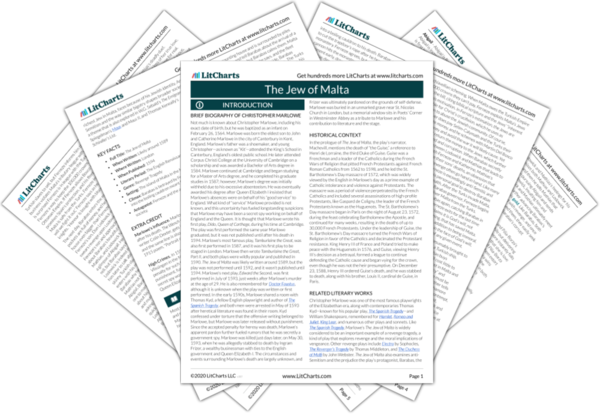Nearly every character in The Jew of Malta lusts for gold, which in the play is symbolic of wealth, power and the greed that often comes along with it. Barabas is the richest Jew in Malta, and even though he is hated in 16th-centry Malta’s anti-Semitic society, he is respected for his wealth. Barabas’s enormous stockpile of gold gives him power in a bigoted society that otherwise dismisses him, and he would rather be hated as Jew than “pitied in a Christian poverty.” Ferneze, Malta’s governor, is also in search of gold to pay the tribute money owed to Selim-Calymath and the Turks, and Ferneze intends to pay using only the gold he exploits from Malta’s Jews. Of course, Ferneze keeps the money he takes from the Jews and never pays Calymath, a greedy decision not unlike how Bellamira (a prostitute) and Pilia-Borza (a thief) plan to extort Barabas’s gold through his Turkish slave, Ithamore. Indeed, most of Marlowe’s characters are motivated by gold, and in their unchecked greed, they will stop at nothing to secure the wealth and power that gold provides.
While his cast of covetous characters suggests that greed is an inherent human trait, Marlowe nevertheless implies that greed and the constant search for gold and wealth is a recipe for disaster that will likely lead to undue suffering, for it is the greediest characters in the play who meet the most gruesome ends. Friars Jacomo and Bernardine condemn Barabas as a Jew, but they try to convert him to fill their parish coffers with gold, and they are ultimately murdered—Barabas and Ithamore strangle Bernardine with a belt, and Jacomo is hanged for the crime. It isn’t long after Pilia-Borza visits Barabas and demands that he “must ha’ more gold” that Barabas murders Pilia-Borza, along with his greedy partners, Ithamore and Bellamira. Even Barabas succumbs to his desire for gold when he schemes with Ferneze to kill Calymath and the Turks in exchange for “great sums of money.” But Ferneze double-crosses Barabas and kills him instead of Calymath, dropping Barabas through his own trapdoor and into the boiling cauldron below. Like the other greedy characters, Barabas’s lust for gold ultimately leads to his untimely death, underscoring Marlowe’s warning against the dangers of greed and humankind’s innate tendency for covetousness.
Gold Quotes in The Jew of Malta
Act 1, Scene 2 Quotes
Barabas: Then Abigail, there must my girl
Entreat the abbess to be entertained.
Abigail: How, as a nun?
Barabas: Ay, daughter, for religion
Hides many mischiefs from suspicion.
Abigail: Thus father shall I much dissemble.
Barabas: Tush,
As good dissemble that thou never mean’st
As first mean truth and then dissemble it;
A counterfeit profession is better
Than unseen hypocrisy.
Act 2, Scene 1 Quotes
Oh my girl,
My gold, my fortune, my felicity;
Strength to my soul, death to mine enemy;
Welcome the first beginner of my bliss:
Oh Abigail, Abigail, that I had thee here too,
Then my desires were fully satisfied.
But I will practise thy enlargement thence:
Oh girl, oh gold, oh beauty, oh my bliss!
Act 2, Scene 3 Quotes
In spite of these swine-eating Christians,
Unchosen nation, never circumcised;
Such as, poor villains, were ne’er thought upon
Till Titus and Vespasian conquered us,
Am I become as wealthy as I was:
They hoped my daughter would ha’ been a nun:
But she’s at home, and I have bought a house
As great and fair as is the Governor’s;
And there in spite of Malta will I dwell:
Having Ferneze’s hand, whose heart I’ll have;
Ay, and his son’s too, or it shall go hard.
Act 5, Scene 2 Quotes
Away, no more, let him not trouble me.
Thou hast thou gotten, by thy policy,
No simple place, no small authority,
I am now Governor of Malta; true,
But Malta hates me, and in hating me
My life’s in danger, and what boots it thee
Poor Barabas, to be the Governor,
Whenas thy life shall be at their command?
No Barabas, this must be looked into;
And since by wrong thou got’st authority,
Maintain it bravely by firm policy,
At least unprofitably lose it not:
For he that liveth in authority,
And neither gets him friends, nor fills his bags,
Lives like the ass that Aesop speaketh of,
That labours with a load of bread and wine,
And leaves it off to snap on thistle tops:
But Barabas will be more circumspect.
Begin betimes, Occasion’s bald behind,
Slip not thine opportunity, for fear too late
Thou seek’st for much, but canst not compass it.
Within here.












